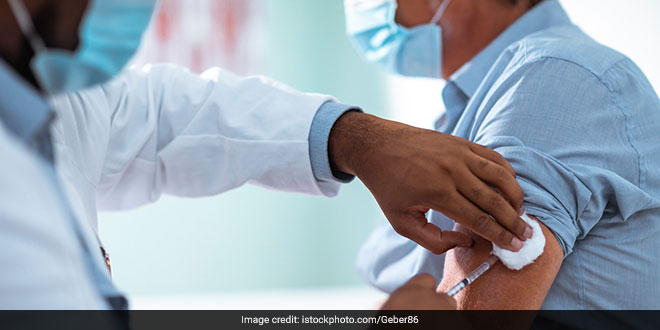Highlights
- The study included more than 57,000 contacts from 24,000 households
- Most of the people in the study were under the age of 60
- Vaccines are vital in helping us return to a normal way of life: Expert
London: A single dose of either the Oxford/AstraZeneca or Pfizer/BioNTech vaccines have been found to cut COVID-19 transmission rates by up to half, according to a new Public Health England (PHE) study on Wednesday. Those given a first dose of either of the two vaccines currently being administered by the National Health Service (NHS) and who became infected with SARS-Cov-2 – the coronavirus which causes COVID-19 – three weeks later were between 38 and 49 per cent less likely to pass the virus on than unvaccinated people.
Also Read: ‘Indian Strain’ Of Coronavirus Found In 17 Countries: WHO
The PHE also found that protection against COVID-19 was seen from about 14 days after vaccination, with similar levels of protection regardless of age of cases or contacts.
A new study shows one dose of the vaccine can cut the risk of household transmission by up to 50 per cent. This is further evidence that the vaccine protects you and those around you. When you get the call, get the jab, said UK Health Secretary Matt Hancock.
The study, which is yet to be fully peer-reviewed, included more than 57,000 contacts from 24,000 households in which there was a lab-confirmed coronavirus case that had received a vaccination, compared with nearly 1 million contacts of unvaccinated cases. Contacts were defined as secondary cases of coronavirus if they tested positive two to 14 days after the initial household case.
Most of the people in the study were under the age of 60. The protection against transmission was found on top of the reduced risk of a vaccinated person developing symptomatic infection in the first place, which has previously been found to be around 60 to 65 per cent – four weeks after one dose of either vaccine.
Also Read: WHO Bolsters Support To India To Tackle Second COVID-19 Wave
Vaccines are vital in helping us return to a normal way of life. Not only do vaccines reduce the severity of illness and prevent hundreds of deaths every day, we now see they also have an additional impact on reducing the chance of passing COVID-19 on to others, said Dr Mary Ramsay, head of immunisation at PHE.
While the findings are seen as “encouraging”, the PHE is calling on people to continue with safety measures against transmission such as “practise good hand hygiene and follow social distancing guidance”. Another study has shown that one in four people have mild, short-lived side effects after receiving the Pfizer or AstraZeneca vaccines. The most common side effects were headache, fatigue and tenderness, most peaking within 24 hours after vaccination and usually lasting one to two days.
The study, which is published in the ‘Lancet Infectious Diseases’ and is based on analysis by researchers at King’s College London with data from the Zoe COVID Symptom Study app, tracks 627,383 users of the app who reported effects within eight days of receiving one or two doses of either vaccines between December 8, 2020, and March 10 this year.
The data should reassure many people that, in the real world, after-effects of the vaccine are usually mild and short-lived, especially in the over-50s, who are most at risk of the infection, said Tim Spector, professor of genetic epidemiology at King’s College London and lead scientist on the symptom study app.
Also Read: COVID-19 Vaccine FAQs: Should Women Avoid COVID Vaccine During Periods? How To Use A Pulse Oximeter?
(Except for the headline, this story has not been edited by NDTV staff and is published from a syndicated feed.)
NDTV – Dettol Banega Swasth India campaign is an extension of the five-year-old Banega Swachh India initiative helmed by Campaign Ambassador Amitabh Bachchan. It aims to spread awareness about critical health issues facing the country. In wake of the current COVID-19 pandemic, the need for WASH (Water, Sanitation and Hygiene) is reaffirmed as handwashing is one of the ways to prevent Coronavirus infection and other diseases. The campaign highlights the importance of nutrition and healthcare for women and children to prevent maternal and child mortality, fight malnutrition, stunting, wasting, anaemia and disease prevention through vaccines. Importance of programmes like Public Distribution System (PDS), Mid-day Meal Scheme, POSHAN Abhiyan and the role of Aganwadis and ASHA workers are also covered. Only a Swachh or clean India where toilets are used and open defecation free (ODF) status achieved as part of the Swachh Bharat Abhiyan launched by Prime Minister Narendra Modi in 2014, can eradicate diseases like diahorrea and become a Swasth or healthy India. The campaign will continue to cover issues like air pollution, waste management, plastic ban, manual scavenging and sanitation workers and menstrual hygiene.
[corona_data_new]


























